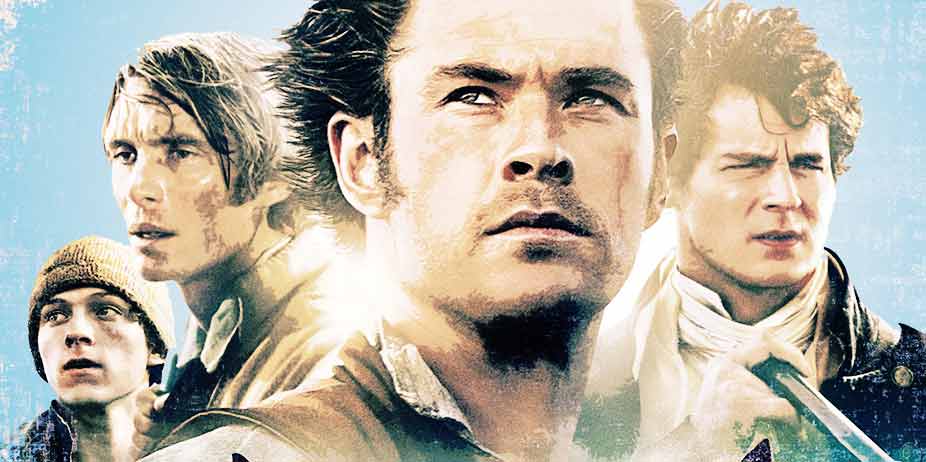
In the Heart of the Sea
(2015)
Even though I had heard from friends that this was a
great film, I held off seeing it for a long time due to
its violence toward whales. I decided on a whim to pluck
it off the library shelf and am glad I did.
One cold night, a haggard figure knocks on the door of a
seaside inn. When the innkeeper’s wife (Michelle
Fairley) turns him aside, novelist Herman Melville (Ben
Wishaw) shows her a letter, a return invitation to come
and interview her husband (Brendan Gleeson) about his
time on board the whaler ship, the Essex, as a cabin
boy. He seeks first-hand accounts to supplement his new
novel, Moby Dick. Reluctant, but in need of funds,
Nickerson tells him a long, terrible story…
When Owen Chase (Chris Helmsworth) sets out that morning
to return to sea, he believes he will soon captain a
ship of his own. Instead, much to his annoyance, the
financial backers choose George Pollard (Benjamin
Walker)… of an old, established and “noble” whaling
family. Resigned, but determined to return with a hold
full of whale oil, Chase tries to rectify his new
appointment as first mate with an inexperienced captain
who believes “testing the sailors’ mettle” means running
them into a violent storm. The men quarrel over whether
to return to shore, and limp onward in pursuit of
whales.
A year later, with only a few barrels of oil in their
hold, they take a chance on a far more daring attempt… a
thousand miles into open sea. A sailor warned them in
South America not to go out there, that a massive whale
almost sank his ship. That’s ridiculous, the men scoff
as they set sail, whales don’t go out for revenge… or do
they?
If you want a mellow maritime adventure, this is not it;
it becomes a story of pure survival and the extreme
lengths men must go to, to make it home. Not all of them
do, and those that return to shore months later, are not
without regret or heinous deeds. These events inspired
Moby Dick, and the film spares you nothing
while showing as little as possible; it implies rather
than shows acts of cannibalism and leaves the audience
to imagine the trauma of eating a former friend dead of
starvation just to live another day. These men make
foolish misjudgments and pay for it with their lives.
The movie seems accurate to the actual events, though it takes dramatic license (here, the whale pursues them multiple times, to destroy them, in a mirrored Moby Dick reference). The whaling scenes were not as bad as I expected, but still hard to swallow. Since it is survival at its most desperate and gruesome, I’ll not watch it a second time… but it held my attention for two hours.
Sexual Content:
None.
Language:
God’s name is often paired with d*mn; multiple uses of
Christ’s name as an exclamation; scattered profanities
and a few uses of s**t.
Violence:
Men spear whales (we see their hides penetrated) and
kill a bull; we see him roll onto his side and blood
turn the water crimson. Men fight off sharks that come
to feast on his hide as they “harvest” the blubber;
“the” whale turns on them, and decimates their ship; he
overturns small boats and tries to drown them; men die
of starvation and injuries; the men (veiled dialogue)
choose to eat their dead friends to survive; a foreign
ship pulls in one longboat with two men in it,
surrounded by their friends’ bones, gnawed white; men
cast lots to decide who will die so the others can eat;
a man shoots himself in the head.
